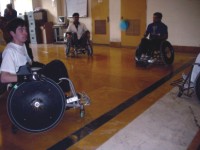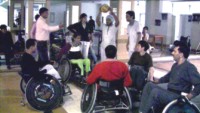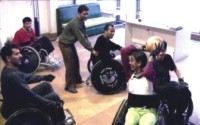|
Endeavour
Rugby for the
Physically
Challenged
Kavita Charanji
 India vs US' shouts the referee as he blows a whistle to start a rugby game. Excited players get set to play and the opposing team members try to 'kill' whoever has the ball. Boisterously, they bump into each other as the ball goes to and fro. As one team scores a goal, elated shouts rent the air. Just another rugby tournament? Not at all. This is a scene from the Delhi-based Indian Spinal Injuries Centre (ISIC) where a group of six wheelchair-bound men, mostly in their 20s, play a game of wheelchair rugby for quadriplegics (those with limited arm and hand movement and paralysed from the chest downwards), called quad rugby. India vs US' shouts the referee as he blows a whistle to start a rugby game. Excited players get set to play and the opposing team members try to 'kill' whoever has the ball. Boisterously, they bump into each other as the ball goes to and fro. As one team scores a goal, elated shouts rent the air. Just another rugby tournament? Not at all. This is a scene from the Delhi-based Indian Spinal Injuries Centre (ISIC) where a group of six wheelchair-bound men, mostly in their 20s, play a game of wheelchair rugby for quadriplegics (those with limited arm and hand movement and paralysed from the chest downwards), called quad rugby.
Rugby has been brought to ISIC by an American C-5/C-6 quadraplegic named Jonathan Sigworth. Two years ago, when he was 19, a bicycle accident in Mussoorie rendered Jonathan paralysed and he had to come to the Centre for treatment. A sophomore in Film and Middle Eastern Studies from the Connecticut-based Wesleyan University, after his accident and initial treatment, he went back to the US. Returning to Delhi and ISIC, during his winter break, he hit upon the idea of introducing wheelchair rugby.
Can the physically challenged withstand the rough and tumble of rugby? Sigworth's response is a resounding affirmative. “Quad rugby is very accessible to quadriplegics,” he says, going on to add, “The sport is also very aggressive so it is very empowering and motivating for patients, who otherwise have very few outlets.”
Back in Connecticut, Sigworth plays in a wheelchair rugby team, where he is the youngest player. Instead of wallowing in misery and self-pity after his fateful accident, he has aggressively picked up the pieces of his life and emerged as a role model for others similarly afflicted. In his words, “ From the very beginning I saw my accident as an opportunity to do my bit with the physically challenged community. Only a disabled person can encourage those similarly affected. When one compares the US with India and other Asian countries, it is clear that in the latter there is far less governmental or infrastructural support for the disabled. In the US with such a disability you become a model citizen who can inspire others through motivational talks. My message is that instead of succumbing to depression, people should see it as a blessing and an opportunity to encourage others.”
 |
Therapist-referee Yotha Singh tosses the ball to start India's first
Quad Rugby game. |
ISIC insiders obviously also have a similar perspective. One such individual is Major HPS Ahluwalia, chairperson of the Centre, who became paralysed neck down after a bullet injury suffered in the course of the 1965 India-Pakistan war. Just before embarking on a game of game of table tennis, he spoke to this correspondent: “Rugby is a wonderful opportunity for our patients because it combines adventure, sport and a sense of competition. Among the welcome spin-offs of this sport is the strengthening of muscles and mobility.”
Another votary of rugby is Chitra Kataria, head of ISIC's rehabilitation department: “Rugby enables the patients to improve the strength of their upper limbs, build their stamina and develop good balance,” she asserts. Chitra has had the opportunity to visit the renowned Savar-based Centre for the Rehabilitation for the Paralysed (CRP) in the course of two conferences organised by the Asian Spinal Cord Injury Network. She is greatly impressed by CRP and its motivated founder Valerie Taylor. In her view, CRP excels in producing effective low cost devices such as stretchers and parallel bars. Another noteworthy feature of the organisation, she says, is its wheelchairs adapted for women to do their domestic chores.
For paraplegic Sunil Phougat 24-year-old the game is a welcome diversion after a recent road accident confined him to a wheelchair. Everyday he comes to the Centre by auto rickshaw and as he says, the cheerful environs never cease to uplift him. “ I used to be a wrestler earlier so welcome the opportunity to play another sport,” he says.
Sigworth, the prime mover in bringing this sport to ISIC, has received unstinting support from his parents, Vicky and Fred Sigworth. His mother has, in fact, had to cope with major tragedies in the family Fred, thankfully now all right, suffered from testicular cancer and a kidney tumour, while her other son, Nathan had a major accident in the US but is fortunately back on his feet. Vicky is grateful for the support the US government extends to the disabled as she says the government footed the bill for Jonathan's helper last year and also bears the cost for the modification of cars and homes. “In India people go back to a second floor apartment and never get out because it is very difficult for them to negotiate the stairs,” she says.
 |
A taste of the action: Jon rams Jyoti (a para and the star player of
her team) as she tries to pass to Shakut. |
Fred, in turn, has been actively involved in his son's Delhi sojourn. “This has proved to be quite an adventure for which Jon has been preparing for months. We spent Christmas day in our living room cannibalising parts to assemble 10 wheelchair frames; the next day these were transported to Delhi, along with 16 wheels as 'luggage'thanks to the Air India Staff.” Private organisations too pitched in, he says. The expenses were covered by a grant from the Christopher and Dana Reeve Foundation and contributions from friends. Likewise donated wheelchairs came from several quad rugby teams as well as the Connecticut-based Gaylord Hospital.
Once in Delhi, a team member Tom Scully worked round the clock along with Shanu, the Centre's wheelchair mechanic, to make the rugby chairs functional as well as convert a few conventional wheelchairs into rugby chairs by welding on metal guards. To play rugby, the players were given armour and gloves.
On the eve of his departure, Jonathan expressed the hope that the sport of rugby for the physically challenged would gather momentum in India and elsewhere in the region. Certainly, organisations such as CRP in Bangladesh would do well to take a cue from ISIC.
Copyright
(R) thedailystar.net 2007 |
